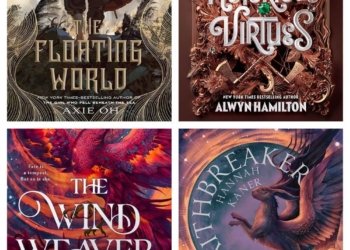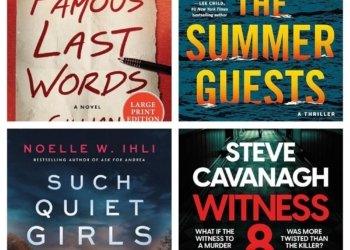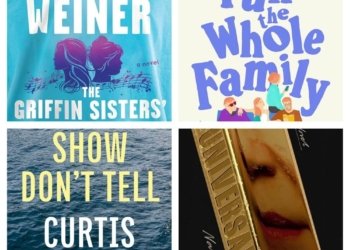No products in the cart.
A Conversation with Khristin Wierman, a Contemporary Fiction Author
Khristin Wierman, author of This Time Could Be Different, was born and raised in a small East Texas town–which means she came into the world a Dallas Cowboys fan and ardently believes “y’all” is a legitimate pronoun.
69
SHARES961
VIEWSKhristin Wierman spent twenty years rising through the marketing ranks of Fortune 500 companies, building a career that was lucrative, ego-boosting, and a little bit soul-crushing. So she quit―and then had no idea what to do with her life. Writing novels ensued. Born and raised in a small East Texas town―which means she came into this world a Dallas Cowboys fan and ardently believes “y’all” is a legitimate pronoun―Khristin enjoys playing golf with her husband and stepson, poker, yoga, chocolate, the Golden State Warriors, and the daily adventure of life with an adorably imperfect cat named Rocco. She lives in San Francisco, California.
Let’s get started with a quick rapid fire.

Q1. If you could be transformed into one animal, which one would you choose?
A big cat.
Q2. Finish the phrase “the way to my heart is…”
Just be straightforward with me. No games.
Q3. Are you more of an introvert or an extrovert?
Definitely an introvert.
Q4. Do you watch shows one episode at a time or binge whole seasons?
My sweet spot is 2-3 at a time…not a full binge, but more than one.
Q5. Would you rather travel to the past or to the future?
Future.
Q6. What is your last Google search?
I looked up how to stop my ADT alerts from coming to my email. I’m getting way too many alerts.
Q7. What object do you misplace or lose the most?
I misplace my phone often but seem to always find it before it’s actually lost.
Q8. What is the kindest thing someone ever did for you?
One of my eighth-grade teachers gave us an assignment to record ourselves giving a speech, then critique it. I had a VERY long list of things I’d done “wrong”. She looked at me so compassionately and said, “I didn’t hear any of those problems. I think you deserve an A.”
Q9. If given the chance to start your life over, would you take it?
No. I don’t regret the events that shaped me, but I can’t imagine having to go through most of them again. “Each of us lives by a set of stories that tells us who we are in the world. They tell us what we’re supposed to do if we want to be,” she made air quotes, “good. What we deserve. What it’s safe to have and what is not….As we age, we have the chance to decide whether those narratives really fit or whether we want something different.”Khristin Wierman, This Time Could Be Different
Q10. What is the best present you have ever received?
I’m totally copping out on this question, but my husband gives amazing presents. They all stand out.
Q11. Describe your style in one word.
Comfort.
Q12. If you were to devote the rest of your life to philanthropy, what cause would you choose?
Nature sanctuaries for animals.
It’s time for a more detailed conversation, Khristin.
You’ve answered our rapid fire so well, Khristin. Now, it’s time for our readers to know more about the person behind the book.
Q. Describe your journey so far.
I came into writing accidentally. I’d left the corporate world and, for the first time in my life, had the opportunity to pause and consider what I really wanted. And found I had no idea what that was, which was unsettling for so many reasons. Many of the books I was reading—and I was quite desperate to figure out what to do, so I was reading a lot—suggested doing something creative, simply as a means of loosening your mind. So, I wrote some scenes. And it felt like magic.
Q. So, what books did you grow up reading?
I’ve always been a reader of many genres. I like realistic books, but I need them to have happy endings. I read Rebecca, by Daphne Du Maurier, when I was in fourth grade—that was the first time I remember being moved by a novel. In my early twenties, I read Augusten Burrough’s memoir, Dry, which touched me in a truly memorable way. I was dealing with some big family issues and reading about his journey – more specifically how he managed to recover from old family trauma – felt like a balm. It made me feel less alone, and it gave me hope that I could change how the rest of my life played out.
Q. Interesting. Has writing and publishing a book changed the way you see yourself?
I think more than changed the way I see myself, it’s helped me see myself for who I really am. As I mentioned above, I had a corporate career. But from where I am now, I can see that those jobs never really fit who I was. Every day was a grind that chipped away at my sense of self instead of nourishing it. With writing, it’s like I finally became me—the me I’ve always been.

Q. Would you share something about yourself that your readers don’t know (yet)?
I’m currently writing a screenplay adapted from my first novel, Buck’s Pantry. It’s like writing in a different language, but I’m having so much fun with it.
Q. Now comes the most anticipated question that every author must answer. How do you process and deal with negative book reviews?
Well, I think the first thing I realized is that I can’t pretend they don’t hurt. It doesn’t matter how poorly written the review may be or how off-mark from the ten previous reviews it may sound…they sting. Sometimes a lot. I do read most of my reviews, but I’m conscious of being in a centered state of feeling supported and good about myself when I do. I don’t go there if I need a boost…because that’s when a negative one can really derail me.
I also think it’s important to remember that as readers, we all have different tastes. Some people prefer non-fiction to novels. Sometimes a reader is in a place where reading about happy endings doesn’t feel good at all because it’s so foreign to what they’re currently experiencing. Books are like food. I could be a chef and make an award-winning chocolate cake. But for someone who’s allergic to chocolate….or starving and craving a savory meal…or just doesn’t like the texture of cake….that dish isn’t going to be something they enjoy or can even digest. And that really has little to do with me or my particular cake.
Q. What comes first for you — the plot or the characters — and why?
I begin with somewhat hazy images of both—an idea of a character and the broad shape of the journey they’re going to take. For me, those two things are sort of inseparable at the inception. Then as the general shape of the story firms up and the characters become clearer, I begin to address them separately.
Q. How do you develop your plot and characters?
Once I have an idea, the first thing I usually do is just start writing some scenes and not necessarily in chronological order. I need specific scenes to test out the idea and figure out if I want to continue or not.
From there, developing the plot and characters is sort of like finding the story. Often there will be gaps that I can’t work out in the moment. I’ve finally learned to be okay with gaps because I’ve bridged enough of them now to know that I can. In Buck’s Pantry, my first novel, I knew that Gillian and her husband were fighting in the early scenes, but I didn’t know about what. In This Time Could Be Different, I knew Madeline was coming from a traumatic past, but it took a while to sort out the elements of that.
I have the most fun at the end, when I get to add little details through the whole book: character gestures and traits that help the reader identify them and clues about the plot I can plant in early chapters. Those little things that you can’t know until the bigger story is settled.
Q. What does literary success look like to you?
It’s taken me a bit of time to figure that out. When my first novel, Buck’s Pantry, was finally published last year, I found myself in a low-grade state of shock. I just couldn’t believe it had happened, and I was grappling with some big fears about being in the spotlight. So, I was both hoping for success and terrified of it.
What I’ve finally come to is that for me, success is finding my tribe of readers. People who enjoy reading the types of books I choose to write (novels), what I choose to write about (imperfect characters unwinding from their pasts) and how I choose to write (pretty direct, simple, certain characters who drop a fair amount of F-bombs).
It’s amazing how good it feels when one stranger, who reads a lot of books, enjoys one of mine. And having my stories receive spotlight (which I’m slowly acclimating to) from publications and outlets like yours means a lot too.

Q. Let’s talk about your book. Tell us about it. No major spoilers.
This Time Could Be Different is a story about two women. Madeline, is a compulsive overachiever who lives by the credo that easy is synonymous with mediocre—which is why she’s a senior vice president at a prominent bank, frantically adheres to a five-step nightly face cream regimen, and panics anytime she’s a foot away from her phone. Madeline works alongside her best friend, Emma—a master juggler of her own career, marriage, and motherhood to a fourteen-year-old daughter who speaks only in baffling acronyms. The path ahead for both women is brimming with opportunity. There’s only one problem: Madeline is miserable.
Seeking purpose in her life while trying to unravel the source of habits she wants to change, Madeline reluctantly agrees to try yoga, meditation, and other wacky suggestions her new-agey therapist tosses her way. She feels as if she’s risking everything―but in doing so, she just might unlock a world more fulfilling than she ever could have imagined.
Q. What part of the book did you have the hardest time writing?
There are some emotional scenes of past trauma that I had to gear myself up for a bit. I didn’t really struggle with the story, though. I rewrote it many times, but it never felt like a grind. It was more about getting it to the place I wanted it to be.
Q. If you could meet your characters, what would you say to them?
To Madeline, I’d say, “Keep going!”
To Emma, I’d say, “Stay true to yourself and make a difference…change that place for the better.”
Q. What is your writing process like? Are you more of a plotter or a pantser?
Panster. Definitely. If I feel stuck, I move to a different paragraph or scene or, worst case, I get up and do something else. Every writer is different, and I think what’s most important is to understand what works (and does not work) for you and trust that.
Q. Let’s talk about the process of writing. When you’re writing an emotional or difficult scene, how do you set the mood?
I’m not sure I really set the mood. For me, it’s more about awareness of where I’m about to go and feeling supported enough to go there. And knowing that I have space on the other side to recover. There’s also something magical when that window opens, and I can get in and out of something difficult quickly. So, I try to be open to that…to knowing when the scene is “ready” to come out and make it’s way onto the page. “People told me things were a certain way, and I accepted it all without question. Hook, line, and sinker, I swallowed every idea that was handed to me whole. Then, because I expected things to be that way, that’s all I saw.”Khristin Wierman, Buck’s Pantry
Q. What has helped or hindered you most when writing a book?
Encouragement helps. Friends who know not to ask every day, “How’s it going?” helps. Finding good editors, with proven track records and demonstrable success, is also key—editors who make the story stronger without overstepping and trying to make it their story. I’ve been super lucky with all of these.
Q. It’s been fun. Now, before we wrap this up, do you have any suggestions to help me become a better writer? If so, what are they?
Trust yourself. Composing a story then bringing it out into the world can be fraught on so many levels. You need people to help you, but at the same time, I think it’s so important to be true to yourself—to the story YOU want to tell; to the way you choose to tell it, and to the process that works for you to get there. It’s all about finding balance between being open to what you have not considered and staying on course to what feels good to you.
Related Posts
A Conversation with Melanie Shawn, a Romance Author
NYT & USA TODAY bestselling author Melanie Shawn lives in Southern California and is a mama to two adult people...
10 Most Anticipated Fantasy Books of Spring 2025
As the seasons change and we step into the vibrant energy of spring 2025, readers everywhere are eagerly anticipating fresh...
10 Most Anticipated Thriller Books of Spring 2025
Are you a bookworm who thrives on heart-pounding suspense and unexpected twists? Get ready to mark your calendars and clear...
8 Most Anticipated Contemporary Books of Spring 2025
Are you a bookworm always on the lookout for the next big literary gem to dive into? Well, get ready...
About Us

Trenzle
Where Trends are made and discovered
Trenzle is your official source of discovering the latest people, work, and ideas that deserve to trend. Discover Authors and their books, Creators and their work, People and their opinions, and Stories from around the globe.
Learn more
Latest Posts
A Conversation with Melanie Shawn, a Romance Author
April 19, 2025
10 Most Anticipated Fantasy Books of Spring 2025
April 18, 2025
Categories
© 2023 Trenzle - Online Author News & Magazine









